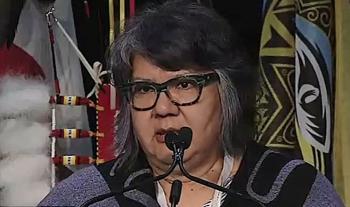Image Caption
Summary
Windspeaker.com Contributor
The Chiefs of Ontario have been looking within and are ready to carve their path into the next decade.
“We really want to be more strategic here in Ontario and have the Chiefs of Ontario organization itself be very stable and again build that political strength up for the organization,” said RoseAnne Archibald, Ontario regional chief of the Assembly of First Nations (AFN).
To become a stronger, more politically-focused organization, the Chiefs of Ontario has spent the last year-and-a-half holding think tanks and strategy sessions to prioritize issues, as well as create processes and operation systems.
“Our efforts in the region are to get ahead of (the) issues to actually be driving the agenda; what we feel we need in Ontario,” said Archibald.
Driving the agenda on both the federal and provincial fronts is one of the priorities Archibald has set for 2020. While she continues to build positive relationships with the Ontario government and Trudeau’s now Liberal minority government, she says she will also continue her sustained political advocacy effort.
“That means we will take some strong positions on certain issues like we have in the past.”
To that end, Archibald wants continued communication between the chiefs and the province. The Chiefs of Ontario leadership council met with Premier Doug Ford “in a long overdue meeting” in October, four months after the provincial election. Archibald plans to expand that relationship and wants chiefs to have access to Ford and his Cabinet.
Archibald says she has spoken with Greg Rickford, provincial minister of Energy, Mines, Northern Development and Indigenous Affairs, about implementing a screening process that would “flag” potential concerns for First Nations in pending provincial legislation.
“I think we’re at the beginning stages of really trying to have that kind of more co-operative relationship around legislation… Our hope is that, as we go, when they come back in February, when the house sits again, that we’ll have a good strategy in place and have a communication kind of process going forward with the government,” she said.
On the federal front, a minority government lends itself to a sense of urgency as history indicates a shorter mandate, says Archibald.
“We really want to ensure that our chiefs and our leadership in Ontario are very connected to this government, because we don’t know how long the government will last. So it’s going to be a priority not only to work with the Liberals, but all of the parties in terms of advancing what our priorities are in Ontario,” she said.
Prior to the October federal election, Chiefs of Ontario released Towards a New Relationship, a discussion document that outlined 10 priorities to guide the chiefs post-election. The new relationship document touches on treaty implementation; lands and resources; housing and infrastructure; internal capacity and governance; First Nations economies; health and well-being; climate change; protecting water; and uplifting women.
“We saw a number of those priorities reflected in the Throne Speech, which was very positive and so we want to continue to work on all those priorities with the federal government,” said Archibald.
Climate change was identified by Trudeau as a pressing issue. Archibald says its impact is felt strongly in First Nation communities in northern Ontario. She says they will be pushing the federal government to ensure money for disaster services isn’t taken from existing programming through Indigenous Services Canada.
She also notes that mitigation of such disasters has become harder since the Ontario government cut back on its environmental funding for First Nations.
Archibald says she will also continue to work with leadership in Grassy Narrows First Nation to get the mercury care home they need. Talks between Grassy Narrows Chief Rudy Turtle and the Liberals have been ongoing for two years, but with no result. At issue is a disagreement about what kind of facility should be built in the community. While Grassy Narrows insists on a specialized mercury treatment centre, the federal government wants to build an assisted living facility.
Also on the health front is tackling intergenerational issues.
“I really started to recognize the need for ongoing healing when I did community visits (last) summer,” said Archibald.
The Aboriginal Healing Foundation was a strong support during the work of the Truth and Reconciliation Commission on Indian residential schools. However, since the foundation’s closure in 2014, nothing has been put in place to deal with intergenerational trauma that has come from such issues as residential schools and the Sixties Scoop. Archibald says she would like to find a model that will revitalize that funding to offer the necessary healing.
Women’s issues and developing young people round out Archibald’s agenda.
An assessment of the activities different groups are engaged in across the region to meet the Calls for Justice that came from the National Inquiry into Murdered and Missing Indigenous Women and Girls is being undertaken, says Archibald.
Once completed, Chiefs of Ontario will work to coordinate the efforts for a co-operative approach that will also see the province and Ottawa involved. Archibald, who serves as portfolio holder for the AFN’s Women Council, says the council is in the process of accessing funding for national action and she assumes some of this funding will go towards regional activities.
Work has just gotten underway with the Ontario First Nation Young Peoples Council to determine a project that will help to build leadership and capacity.
“Continuing to promote youth leadership, getting them ready for the days ahead when they will actually become leadership of the day, this is an ongoing priority for me,” said Archibald.

